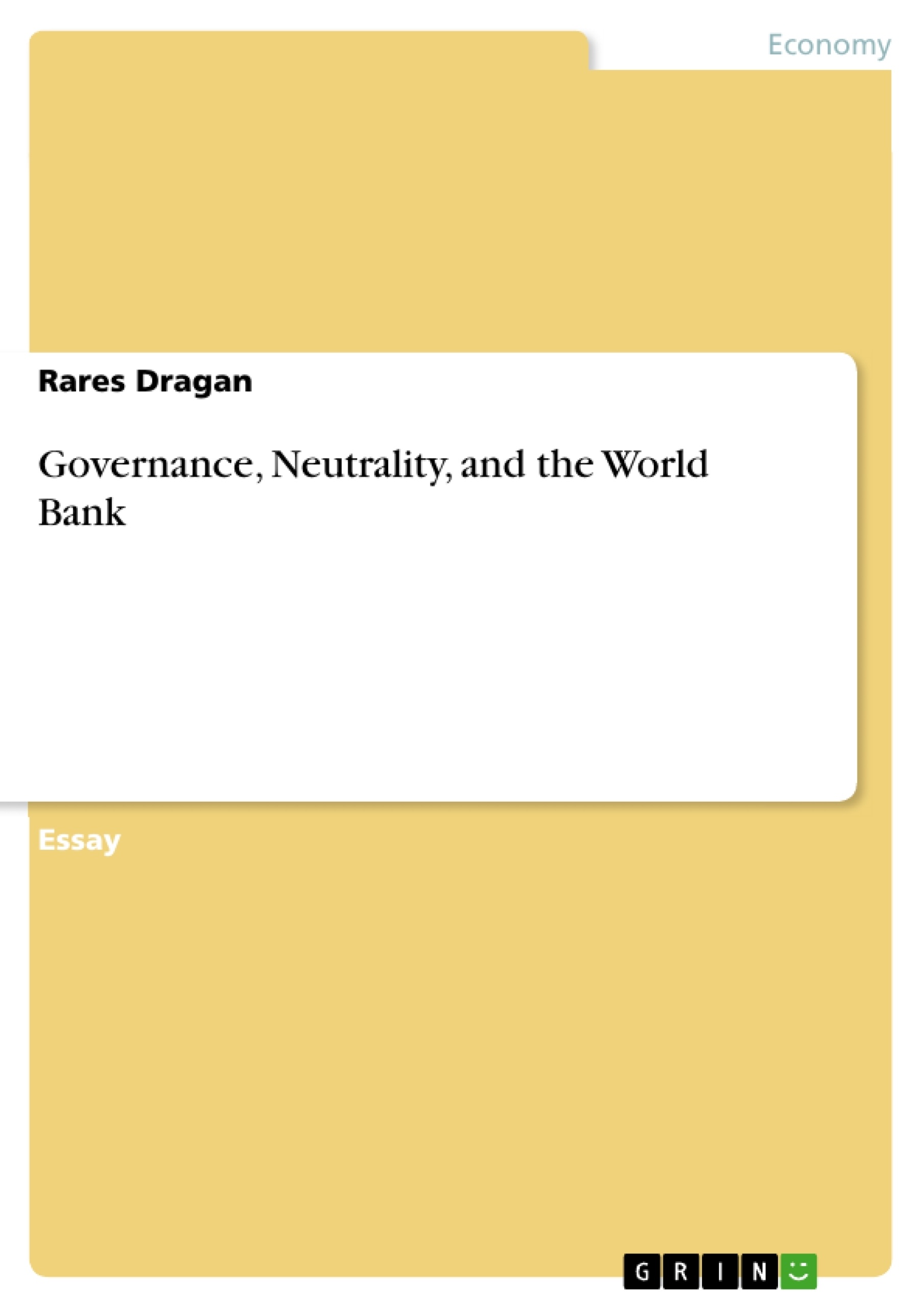In this age of globalization, there is an expanding demand for global governance. Moreover, global governance should be perceived alongside a possible continuity of governance that ranges from international order to world government. In the late 1980s, the term of “global governance” was introduced, and it was defined as the possibility of states to collaborate under anarchy, by setting up international institutions. Global governance is a broad, ever-changing and intricate process of reciprocal decision-making that is always fluctuating. Furthermore, there is no singular form or model of global governance and no single structure or set of structure. The complexity of global governance contains a wide combination of actors, institutions, and processes that unfold at three different levels: supranational; national and subnational.
The World Bank’s activities around the world are a frequent matter of analysis. This can be happening, because of the significance and impact of the Bank’s policies and recommendations on local societies and governments. The Bank’s mandate is without any doubt limited to the economic and financial aspects of government. Built on this, The World Bank take up an officially neutral position regarding internal politics of the nations with which it works, as shown in the article of Stevens and Gnanaselyam (1995). Nevertheless, other scholars, as Williams and Young (2005), argued that such neutrality is hard to realize, due to the fact that any policy the Bank proposes is based on pre-settled premises, based on liberal ideas placed on liberal ideals, which eventually become forced upon the states that want to receive a loan from the Bank.
This paper will display both views and apply the concepts presented in an empirical case in order to emphasize the World Bank’s governance as a transnational organization.
Inhaltsverzeichnis (Table of Contents)
- Introduction
- Conceptual framework
- Neutrality of the World Bank's policies
- Empirical case: The World Bank in Brazil
- Conclusions
Zielsetzung und Themenschwerpunkte (Objectives and Key Themes)
This paper aims to analyze the governance of the World Bank as a transnational organization. It explores both the Bank's stated commitment to neutrality in its policies and the potential influence of its liberal ideals on its development projects.
- The role of the World Bank in global governance
- The concept of governance and its implications for development
- The World Bank's neutrality in its policies and its relationship with partner countries
- The impact of the World Bank's policies on local societies and governments
- The relationship between economic and political governance in development
Zusammenfassung der Kapitel (Chapter Summaries)
- Introduction: This chapter introduces the World Bank as a key player in international finance and development, highlighting its mission and organizational structure. It also discusses the growing importance of global governance in the era of globalization and defines the concept of "transnational" as a supraterritorial form of interconnectedness.
- Conceptual framework: This chapter delves into the concept of governance, exploring its different dimensions and its relevance to the World Bank's activities. It examines how governance is used as a tool to assess a country's potential for development and how the World Bank's involvement in governance has evolved over time.
- Neutrality of the World Bank's policies: This chapter examines the World Bank's claim to neutrality in its development policies. It analyzes how the Bank maintains its neutrality while still influencing the economic and social policies of recipient countries. The chapter also discusses the potential for bias in the Bank's policies due to its reliance on liberal ideals.
Schlüsselwörter (Keywords)
The paper explores the key concepts of global governance, transnational organizations, development, neutrality, liberal ideals, and the role of the World Bank as a key player in international development.
Frequently Asked Questions
What is the World Bank's stance on political neutrality?
The World Bank officially maintains a neutral position regarding the internal politics of member nations, focusing its mandate strictly on economic and financial aspects of government.
How do critics view the World Bank's neutrality?
Critics argue that true neutrality is impossible because the Bank's policies are rooted in liberal ideals, which are often imposed on countries as conditions for receiving loans.
What is meant by "Global Governance" in this context?
Global Governance refers to the complex process of decision-making involving states and international institutions to collaborate under conditions of global anarchy, operating at supranational, national, and subnational levels.
What role does the World Bank play in development?
The Bank uses governance as a tool to assess a country's potential for development and influences local societies through its economic policies and project recommendations.
Is there an empirical example discussed in the paper?
Yes, the paper applies these concepts to an empirical case study of the World Bank's activities and influence in Brazil.
- Quote paper
- Rares Dragan (Author), 2017, Governance, Neutrality, and the World Bank, Munich, GRIN Verlag, https://www.grin.com/document/380509



